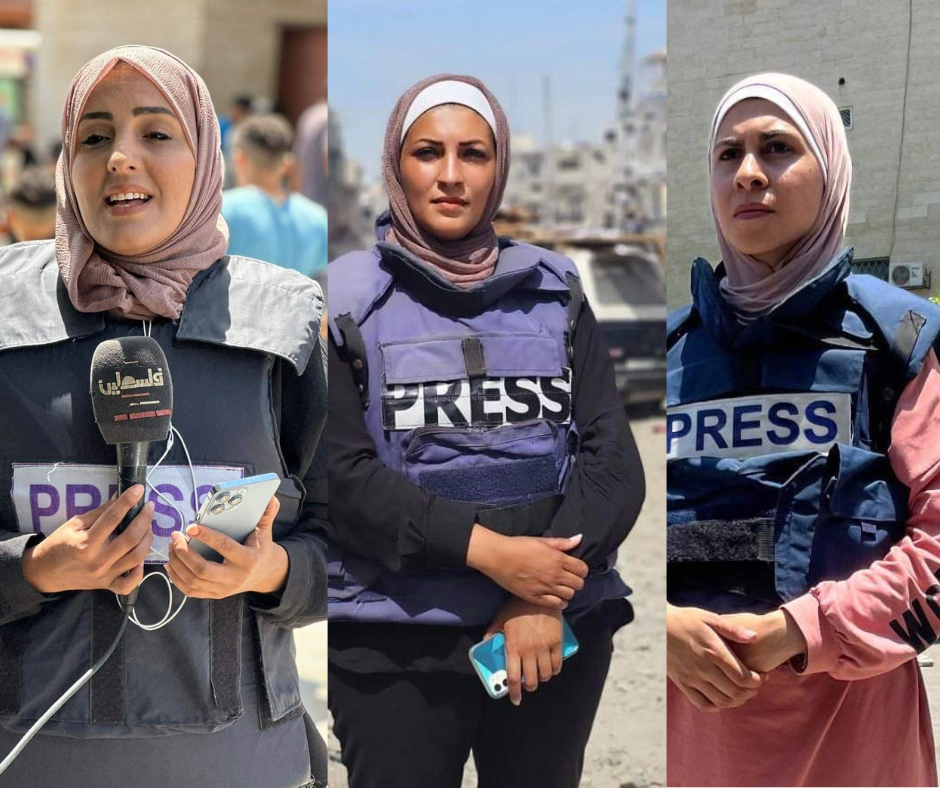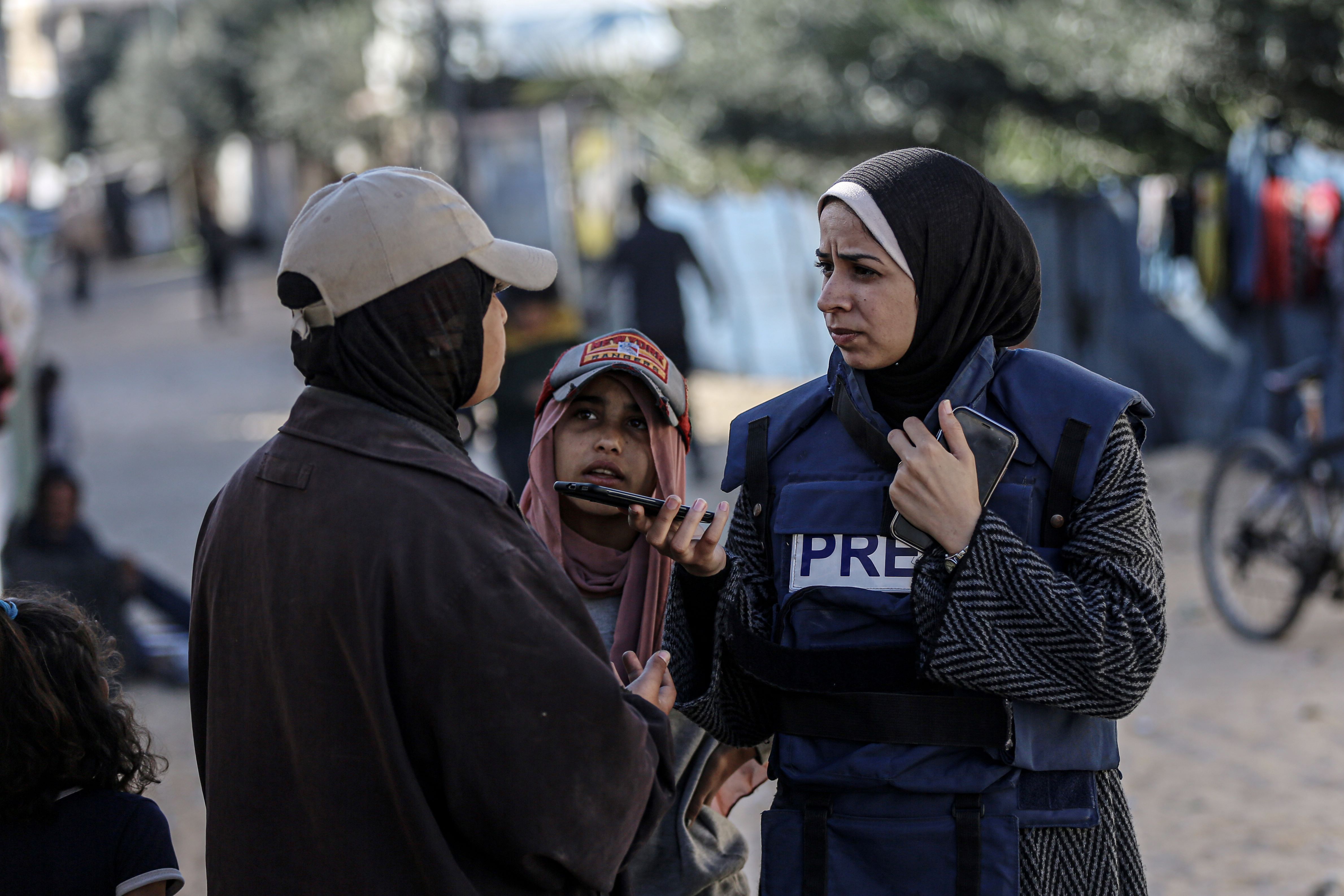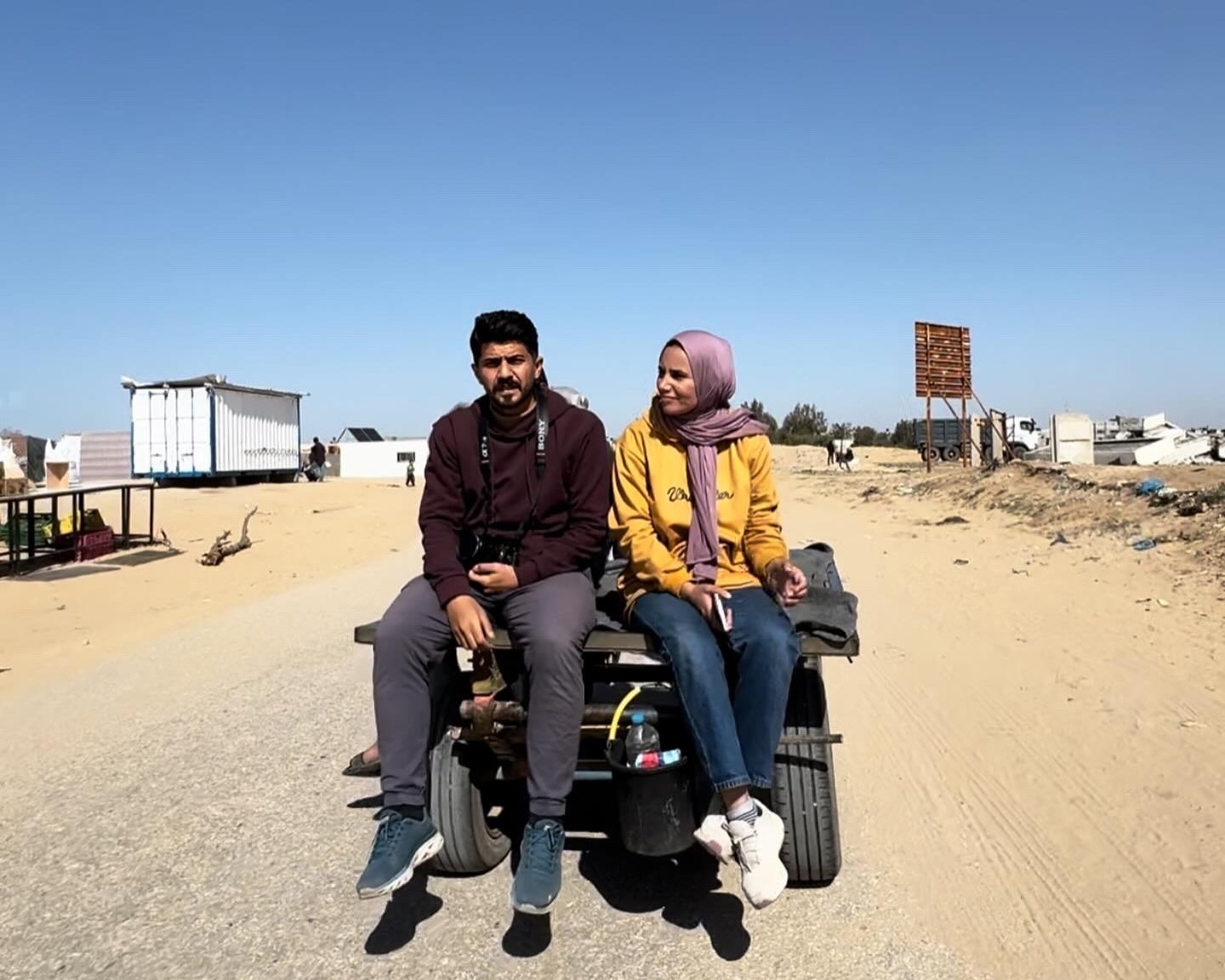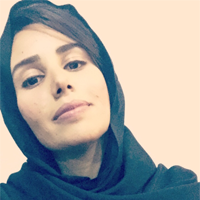Being a journalist, particularly a female journalist covering the genocide in Palestine without any form of protection, makes practicing journalism nearly impossible. When the journalist is also a mother haunted by the fear of losing her children, working in the field becomes an immense sacrifice.
Images fall short of conveying the true reality in Gaza, as it is impossible to fully capture what happens behind the scenes of journalistic coverage. It is equally challenging to document the full extent of the hardships and suffering journalists endure. Those who are also mothers bear an especially heavy burden, facing immense pressures as they navigate multiple fronts—balancing their roles as mothers with their essential duty to document and report the truth.
A Close-Up Look at Life Inside a Container
I wake up exhausted after another restless night in a container, our sixth shelter since the latest evacuation. A large insect called a Forty-Legger crawled inside, terrifying my three young children. I was just as frightened; it resembles a scorpion and can be just as poisonous.
Stories like this may seem familiar to many displaced people living through similar daily ordeals. Yet, it remains deeply painful and magnifies our sorrow. Life in these conditions barely resembles what we think of as human existence, but we are forced to endure it. Without this resilience, the situation would be unbearable.
Every morning, instead of saying "Good morning," I find myself asking, "Who lit the stove we’re in?" By 7 a.m., the sun begins its revolution, transforming the container—and us—into a scorching oven. We wake up in a panic and scramble to open the container door, fleeing outside with my children.
I wake up exhausted after another restless night in a container, our sixth shelter since the latest evacuation. A large insect called a Forty-Legger crawled inside, terrifying my three young children. I was just as frightened; it resembles a scorpion and can be just as poisonous.
Daily Struggles
Each day begins with the struggle to find water and wait for the electricity to return so we can charge our phones and the battery-powered light we use at night. I work tirelessly to manage daily chores—preparing breakfast and hand-washing clothes—while my children play in the sand instead of watching educational programs or children’s shows. Amid these challenges, we live with the constant roar of explosions and the persistent hum of drones overhead.
My ten-year-old son, Abed Al-Rahman, often asks, “Mom, when can we go back home?” The emotional weight of this question is profound. I never imagined living in a container so far from what we once called home. I tell him, “Pray for us to return soon.” Then I remember our house was destroyed in a bombing by the Israeli occupation. I add, “First, we have to wait for the war to end. Then, we can go back to the north of Gaza and build a new home.”
Working From the Camp
Another layer of hardship unfolds when I try to work online from the container. The poor internet makes it difficult to keep up with the news, and I am frequently interrupted by my children’s constant requests: “Mom, I want…” Each interruption forces me to pause my work to attend to them, and when I return to my tasks, it’s hard to regain focus and finish the report I’ve been working on.
The children play their favourite game, building a tent out of mattresses and sheets. My three-year-old son, Muhammed, grabs a pillow and throws it at his brother, shouting, “A rocket.” Their tragic role-playing is a coping mechanism for the fear inside them, a black comedy born out of the relentless bombings they’ve endured for the past ten months.
A Journalist and a Journalist’s Wife
Nour Al-Suwayrki, a journalist and television correspondent for Al-Sharq Channel, describes her experience of covering the war in two distinct phases. She explains, “My time with my children can be divided into two parts: when they were here in Gaza and when they travelled abroad. Before they left, it was extremely difficult. Both my husband and I work in journalism, and managing fieldwork far from home was an added strain. We often had no choice but to leave our children with relatives or displaced neighbours.”
Al-Suwayrki recalls some of the most difficult moments she faced: “There were times when I had to bring my children to the work site. On one such day, a bombing happened near my car, where they were taking shelter from the sun. I was frantic, immediately stopped filming, and rushed to check on them. Thankfully, they were unharmed.”
The Hard Choice of Safety
Many families, particularly those of journalists, face forced separation. Sometimes, evacuation is compelled by the occupation; other times, the decision is made for safety and self-preservation. Nour and her husband decided to send their children to Egypt until the war ends. “After hearing that Rafah could be invaded, I was terrified for their safety,” Nour explains in an interview with Al Jazeera Journalism Review. “To ease some of the psychological burden, I sent my children to Egypt to stay with my family. But the feeling of oppression remains because I was forced into this choice. I stay in constant touch with them on WhatsApp, but my worry never fades, especially when they are late to respond or feeling unwell.”
Nour adds, “I am currently displaced in a tent inside Al-Aqsa Martyrs Hospital, alongside other journalists. Despite all the adversity, we continue our work. I honestly don’t know where we find the strength to carry on or how we manage to keep going.”
The Lie of Safe Zones
In the chaos of wartime, balancing work and childcare is an immense challenge, especially for journalist mothers in Gaza, where nurseries and schools are non-existent. Islam Al-Zaanoun, a journalist and correspondent for Palestine TV who also freelances for other channels, describes this struggle. “As the war dragged on, our channel’s operations became more structured,” Al-Zaanoun explains. “I’ve opted for morning shifts to ensure I’m available for my children. But freelancing means I must be ready for live coverage or recording at any time, which is incredibly exhausting.”
The Israeli occupation frequently issues images of so-called "safe zones," urging residents to evacuate. However, this is largely propaganda and manipulation. The widespread targeting of civilians shows that no area is truly secure, highlighting the stark contrast between official claims and the lived realities of those affected. Islam and her family experienced this firsthand, as they were displaced multiple times from areas labelled as safe, only to see those same areas bombed and stormed despite their supposed security.
Giving Birth Under Bombardment
Islam Al-Zaanoun’s story is particularly harrowing due to the extreme conditions she faced. In an interview, she described the daunting challenge of covering the war while nine months pregnant, surrounded by fire on all sides. Reflecting on the day she gave birth, she shared, “That day is unforgettable. The bombing intensified, and the electricity went out during my caesarean section. My fear peaked at that moment.”
That day is unforgettable. The bombing intensified, and the electricity went out during my caesarean section. My fear peaked at that moment.
After giving birth, Al-Zaanoun endured a gruelling evacuation. “Several days later, I had to cross what Israel calls the safe passage from north to south. I walked eight kilometres on foot, carrying my newborn, with my caesarean section still healing. This journey had severe repercussions on my health.”
Mother, Journalist, and Widow of a Martyr Journalist
“I am the widow of the martyr journalist Rushdi Al-Sarraj, who was killed in the first month of the war. At the time, my daughter was just 11 months old,” says Shorouk Al-Aila, a director and investigative journalist, speaking to Al Jazeera Journalism Review with evident sadness.
Regarding her professional life, Shorouk shared: “My work hours are unpredictable. I often work all day, including my days off. Due to the ongoing transportation crisis, I usually return home late, sometimes having to walk two to three hours. I rely on my sisters to look after my daughter while I’m at work. Although she loves them, she misses me, and when she cries, I may cancel my work commitments and rush back to her.”
While reporting, I’ve often found myself near explosions, like the one during the Nuseirat massacre. I was dangerously close to the blast and completely lost my composure, overwhelmed by anxiety for my daughter's safety. My fear for her has only intensified since her father’s death
Al-Aila's greatest fear is death. “My most profound concern amid this genocide is the fear of dying and being buried under rubble,” she explains. “While reporting, I’ve often found myself near explosions, like the one during the Nuseirat massacre. I was dangerously close to the blast and completely lost my composure, overwhelmed by anxiety for my daughter's safety. My fear for her has only intensified since her father’s death.”
Recalling the moment she lost her husband, who was also her colleague, Shorouk says, “It was the worst situation I’ve faced since the genocide began. I was with him when he was killed, holding his hand.” Reflecting on her dual role as a mother and journalist, she adds, “Being both under these circumstances isn’t just challenging—it feels almost impossible. Yet, somehow, we manage to turn this impossibility into something achievable.”














































